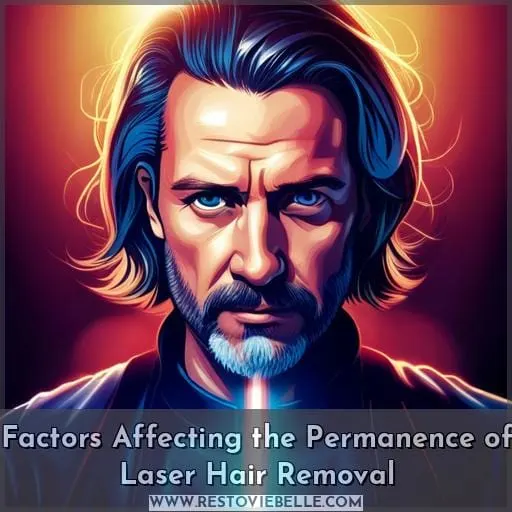This site is supported by our readers. We may earn a commission, at no cost to you, if you purchase through links.
 Uncover the truth about hair laser removal: are the results really permanent?
Uncover the truth about hair laser removal: are the results really permanent?
Laser hair removal is a popular option for getting rid of unwanted hair, but how long do the effects actually last? In this article, we will explore the science behind laser hair removal and discuss factors that can affect its permanence.
Discover if laser treatment is truly your ticket to never shaving or waxing again, or if maintenance treatments are necessary to maintain smooth skin.
Table Of Contents
- Key Takeaways
- How Laser Hair Removal Works
- Factors Affecting the Permanence of Laser Hair Removal
- Who is a Good Candidate for Laser Hair Removal?
- Potential Risks and Side Effects of Laser Hair Removal
- Long-Term Results of Laser Hair Removal
- Frequently Asked Questions (FAQs)
- How long does each laser hair removal treatment session typically last?
- Is laser hair removal covered by insurance?
- Can laser hair removal be used on all skin types?
- Are there any specific preparations required before undergoing laser hair removal?
- Are there any alternative methods to laser hair removal for permanent hair removal?
- Conclusion
Key Takeaways
- Laser hair removal works by targeting and damaging hair follicles using heat from a laser.
- The permanence of laser hair removal depends on factors such as hair color, skin type, and hormonal changes.
- Dark, coarse hair and light skin are ideal for laser hair removal.
- Maintenance treatments are needed for long-term results, with a frequency of every 6-12 months.
How Laser Hair Removal Works
Laser hair removal works through a process called selective photothermolysis, which involves the use of laser light to target and destroy hair follicles.
The heat from the laser is absorbed by the pigment in the hair, causing damage to the follicle and preventing future growth.
This method selectively targets dark hairs while leaving surrounding skin unharmed.
Selective Photothermolysis
Laser hair removal works through a process called selective photothermolysis, where the heat from a laser targets and destroys cells that have a high amount of pigment.
The melanin in the hair absorbs the laser energy, which then damages the surrounding hair follicles and inhibits future hair growth.
The effectiveness of treatment depends on factors such as hair color, skin type, and individual response to treatment.
Multiple sessions may be required for optimal results, and maintenance treatments may be needed for long-term reduction in hair growth.
Destruction of Hair Follicles
When undergoing laser hair removal, the concentrated beam of light targets and destroys the hair follicles, preventing future hair growth.
The intense heat from the laser damages the hair follicles, inhibiting their ability to produce new hairs.
While laser hair removal can lead to long-term reduction in hair growth, it doesn’t guarantee permanent results. Multiple treatments may be required for optimal effectiveness and maintenance sessions might be necessary to sustain desired outcomes.
Factors Affecting the Permanence of Laser Hair Removal
When it comes to the permanence of laser hair removal, there are several factors that can influence the results.
One important factor is hair color. Laser hair removal works best on dark, coarse hairs because they’ve more pigment to absorb the laser energy.
Another factor is skin type; people with lighter skin tones tend to see better results as there’s a greater contrast between their skin and hair color.
Additionally, hormonal changes in the body can affect hair growth patterns and may require additional maintenance treatments for long-term reduction.
Hair Color
If you have darker hair, laser hair removal is more likely to provide long-lasting results.
The effectiveness of laser hair removal can be influenced by the color of your hair.
Darker hair absorbs more light energy from the laser, making it easier to target and damage the hair follicles.
On the other hand, lighter-colored hairs such as gray or blonde may not absorb enough light for effective treatment.
This means that multiple treatments are often needed for those with lighter hairs, and maintenance treatments may be recommended to ensure long-term results.
Skin Type
Your skin type plays a crucial role in determining the permanence of laser hair removal results.
Light skin types tend to have better results, as the laser targets the contrast between dark hair and light skin more effectively.
On the other hand, dark skin types may experience less effective outcomes due to higher levels of melanin in their skin, which can absorb more of the laser energy instead of targeting the hair follicles.
Factors such as your specific Fitzpatrick scale classification and overall complexion can greatly affect how well laser hair removal works for you.
Hormonal Changes
To maintain long-lasting results from laser hair removal, it’s important for you to understand how hormonal changes can affect the permanence of the treatment.
Hormonal changes during pregnancy, menopause, puberty, and even with birth control or weight loss can impact your hair growth cycle. These fluctuations in hormone levels may stimulate new hair growth or cause existing hairs to become thicker and darker.
Therefore, it’s crucial to discuss any hormonal imbalances with your healthcare provider before undergoing laser hair removal for optimal and longer-lasting results.
Who is a Good Candidate for Laser Hair Removal?
If you’re considering laser hair removal, it’s important to know if you’re a good candidate for the procedure.
Suitable candidates for laser hair removal typically have dark, coarse hair and light skin. This is because the laser targets melanin in the hair follicle, so having a high contrast between your skin and hair color increases the effectiveness of the treatment.
However, people with other skin types and lighter or finer hairs may still benefit from laser hair removal depending on their individual circumstances and goals.
Suitable Hair and Skin Types
When considering laser hair removal, it’s important to determine if you’re a good candidate based on your hair and skin types.
- Fair Skin: People with fair skin tend to have good results with laser hair removal as the contrast between their light skin and dark hair makes it easier for the laser to target the melanin in the hair follicles.
- Dark Skin: Laser hair removal can also be effective for people with dark skin, although special precautions need to be taken due to higher levels of melanin in the skin.
- Coarse Hair: The coarser your natural hair texture, the better results you may see from laser treatment as coarse hairs absorb more energy from lasers compared to finer hairs like blond or gray ones which may not respond well.
By understanding these considerations, you can determine if laser hair removal is right for you.
Medical Considerations
Before undergoing laser hair removal, it’s important to consider certain medical factors that determine whether you’re a good candidate for the procedure.
Laser hair removal is generally safe, but there are some considerations to keep in mind.
It may not be suitable for pregnant women or individuals taking certain medications.
Additionally, alternative hair removal methods and their associated risks should be taken into account when deciding on laser hair removal as a treatment plan.
Discussing these factors with a qualified professional can help ensure the safety and effectiveness of your laser hair removal experience.
Potential Risks and Side Effects of Laser Hair Removal
When undergoing laser hair removal, there are potential risks and side effects that you should be aware of.
These include:
- Skin irritation
- Pigment changes
- Scarring
While these side effects are usually temporary, it’s important to discuss them with a qualified professional before proceeding with the treatment.
Skin Irritation
If you experience skin irritation after laser hair removal, it’s important to consult with your dermatologist or healthcare provider.
Mild skin irritation is a common side effect of the procedure and can include temporary redness, swelling, and pain.
However, in rare cases, there may be a risk of scarring. To minimize these risks and protect your skin during the healing process, it’s recommended to apply SPF30 sunscreen on treated areas such as the upper lip or chin.
Pigment Changes
Experiencing pigment changes is one of the potential risks and side effects you may encounter during laser hair removal.
These changes can include hyperpigmentation or hypopigmentation, where the treated area becomes darker or lighter than the surrounding skin.
While these pigment changes are usually temporary, it’s important to be aware of them before undergoing laser hair removal.
Make sure to discuss any concerns with your doctor and follow proper aftercare instructions to minimize the risk of pigment changes occurring.
Scarring
Scarring is a potential risk and side effect of laser hair removal, but it’s relatively rare.
Most people who undergo laser hair removal don’t experience scarring.
However, there are steps that can be taken to prevent scarring during the procedure.
These include:
- Ensuring that the treatment is performed by a qualified professional.
- Following proper aftercare instructions.
In the event that scarring does occur, there are treatments available to minimize its appearance and promote healing.
Long-Term Results of Laser Hair Removal
When considering the long-term results of laser hair removal, it’s important to understand that while it can provide significant reduction in unwanted hair, it doesn’t guarantee permanent removal.
Laser hair removal works by damaging the hair follicles to inhibit future growth, but some regrowth may occur over time.
Many individuals find that maintenance treatments are needed for long-term results and continued reduction of hair in treated areas.
Hair Reduction Vs. Permanent Removal
When considering the long-term results of laser hair removal, it’s important to understand the difference between hair reduction and permanent removal.
Laser hair removal offers temporary reduction in hair growth, but it doesn’t guarantee permanent elimination of unwanted hairs. While some individuals may experience long-lasting or even permanent results from laser treatments, others may require maintenance treatments to maintain the desired level of hair reduction.
This distinguishes laser hair removal from other methods that claim to provide permanent removal of unwanted body hairs.
- Temporary vs. Permanent: Laser Hair Removal provides temporary reduction in hair growth rather than complete and permanent elimination.
- Hair Regrows vs. Permanent Removal: After a certain period, regrowth occurs with finer and lighter-colored hairs compared to their original state.
- Maintenance Treatments vs. Permanent Removal: To achieve long-term effects, individuals might need occasional touch-up sessions after initial treatment courses.
Maintenance Treatments
To maintain the long-term results of laser hair removal, you’ll need to schedule periodic maintenance treatments.
These treatments help to ensure that any regrowth is targeted and controlled, allowing for continued hair reduction over time.
The frequency of maintenance treatments can vary depending on individual needs and factors such as hair growth patterns.
The cost of these sessions may vary based on the treatment area and clinic pricing structure.
While there are minimal risks associated with maintenance treatments, it’s important to discuss any concerns with your provider before scheduling them.
| Frequency | Duration |
|---|---|
| Every 6-12 months | Varies based on individual needs |
Frequently Asked Questions (FAQs)
How long does each laser hair removal treatment session typically last?
Each laser hair removal treatment session typically lasts between a few minutes to an hour or longer, depending on the size of the area being treated. It’s important to consult with your doctor for a more accurate estimate based on your specific needs.
Is laser hair removal covered by insurance?
No, laser hair removal is typically not covered by insurance. It’s considered a cosmetic procedure and therefore falls outside the scope of most insurance policies. However, it’s always best to check with your specific insurance provider for clarification on coverage.
Can laser hair removal be used on all skin types?
Yes, laser hair removal can be used on all skin types. The effectiveness may vary depending on the contrast between hair and skin color, but advancements in technology have made it possible to safely treat a wider range of individuals.
Are there any specific preparations required before undergoing laser hair removal?
Before undergoing laser hair removal, it’s important to follow specific preparations.
These may include:
- Avoiding sun exposure
- Lightening the skin if necessary
- Refraining from other hair removal methods
- Discontinuing blood-thinning medications
Are there any alternative methods to laser hair removal for permanent hair removal?
Yes, there are alternative methods to laser hair removal for permanent hair removal.
These include electrolysis and intense pulsed light (IPL) therapy.
Each method has its own benefits and considerations, so it’s important to consult with a professional to determine the best option for you.
Conclusion
To wrap up, while laser hair removal can provide long-term hair reduction, the results aren’t always permanent.
Factors such as hair color, skin type, and hormonal changes can affect the permanence of the treatment.
It’s important to note that maintenance treatments may be necessary to maintain smooth skin.
However, laser hair removal remains a popular option for those looking to reduce the need for shaving or waxing.
Consultation with a qualified professional is recommended to determine if laser hair removal is the right choice for you.











